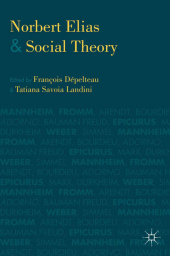 Neuerscheinungen 2013Stand: 2020-01-07 |
Schnellsuche
ISBN/Stichwort/Autor
|
Herderstraße 10
10625 Berlin
Tel.: 030 315 714 16
Fax 030 315 714 14
info@buchspektrum.de |

Fran‡ois Dépelteau, T. Landini
(Beteiligte)
Norbert Elias and Social Theory
Herausgegeben von Dépelteau, Fran‡ois; Landini, T.
1st ed. 2013. 2013. xi, 330 S. 229 mm
Verlag/Jahr: SPRINGER PALGRAVE MACMILLAN; PALGRAVE MACMILLAN US 2013
ISBN: 1-349-45716-7 (1349457167)
Neue ISBN: 978-1-349-45716-8 (9781349457168)
Preis und Lieferzeit: Bitte klicken
This book will compare the approach and works of Norbert Elias, well known for his analysis of the civilizing process, his work on sport and violence and, more largely, his figurational approach, with other important social theories both classical and contemporary.
Introduction; Tatiana Savoia Landini and Francois Depelteau SECTION I : UNDERSTANDING ELIAS 1. Main Principles of Elias´s Sociology; Tatiana Savoia Landini 2. Five misunderstandings of Elias´s Thought; Nathalie Heinich 3. Ariel or Caliban? The Civilizing Process and its critiques; Francois Depelteau, Enio Passiani and Ricardo Mariano SECTION II: ELIAS AND CLASSICAL SOCIAL THEORY 4. The Epicurean in Elias; Anna-Louise Barbara Evers 5. Elias, Freud and the Human Sciences; Bernard Lahire 6. Contradiction and Interdependency: the sociologies of Karl Marx and Norbert Elias; Chris Powell 7. Past and Present in Sociological Theory: similarities and differences between Emile Durkheim and Norbert Elias; Enio Passiani 8. Norbert Elias and Emile Durkheim: seeds of a historical sociology of knowledge; Hector Vera 9. Irony as vocation; Marta Bucholc 10. Taking up the torch from Max Weber: Norbert Elias and the challenging of classical sociology; Markus Schroer and Jessica Wilde 11. From Elias back to Simmel; Leopoldo Waizbort SECTION III: ELIAS AND CONTEMPORARY SOCIAL THEORY 12. Norbert Elias and Karl Manheim: contrasting perspectives on the sociology of knowledge; Richard Kilminster 13. Under the Shadow of the Authoritarian Personality: Elias, Fromm, and Alternative Social Psychologies of Authoritarianism; Tim Berard 14. Norbert Elias and Hannah Arendt on Philosophy, Sociology and Science; Philip Walsh 15. Individualization and social dis/integration in "postmodernity": A comparative note on Zygmunt Bauman and Norbert Elias; John Flint and Ryan Powell 16. Comparing Elias and Bourdieu as relational thinkers; Francois Depelteau 17. From figuration to coordination: an analysis of social interdependence mechanisms; Jean-Hugues Dechaux
"Norbert Elias and Social Theory is a very welcome addition to the Elias collection, not least because the main aim of this volume is to demystify the work of Elias and to enable readers to better understand and assess his contribution to the discipline. As such, this book looks set to make a positive contribution to Elias´s legacy and to make his work more accessible to a broader range of researchers and academics." - British Journal of Sociology of Education
´Norbert Elias was one of the most important and wide-ranging sociological theorists of the twentieth century. But he was much more than a mere ´theorist´ his work was always grounded in empirical research. That is why, in the twenty-first century, there is a thriving global research tradition using his ideas to understand the world today and where it is going. This edited volume brings together contributions from younger researchers working in Elias´s footsteps on four continents, and in doing so paves the way for the continuation of a vibrant and essential tradition.´ - Stephen Mennell, General Editor, the Collected Works of Norbert Elias
´This superbly organized collection of essays provides a long overdue systematic comparison between the work of Norbert Elias and that of other major social thinkers of the classical and contemporary eras. The wide-ranging discussions presented herein will no doubt prove indispensable for scholars and students of sociological theory. In Norbert Elias and Social Theory, Elias´s work is subjected to a series of rigorous critical and comparative analyses which, when taken together, clearly consolidate his status as one of the most important social scientists of the twentieth century, and one whose work retains an enduring relevance and significance to this day. A must-read.´ Jason Hughes, Professor, Department of Sociology, University of Leicester, UK


